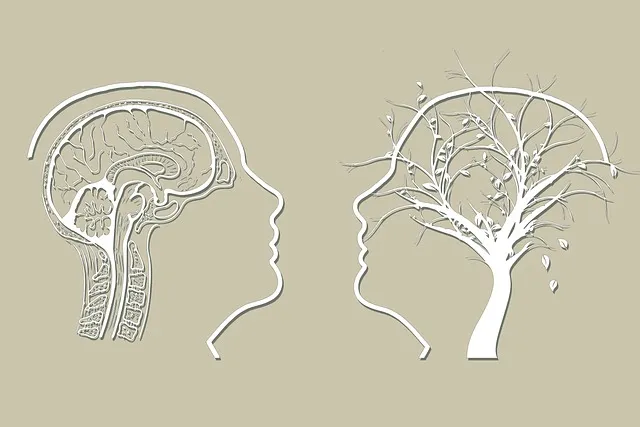Mental health policy is key to shaping access and quality of care at entities like the Kaiser Permanente behavioral health center in Lone Tree, directly impacting individuals' behavioral wellness. By understanding insurance coverage, treatment accessibility, cultural competency (e.g., Mental Wellness Journaling Exercise Guidance), and community interventions, advocates can identify gaps and drive improvements in mental health services. The Lone Tree center's success lies in its holistic approach, integrating clinical treatments with community engagement programs for diverse populations, influencing local policies, and fostering a culture prioritizing self-care. A comprehensive analysis should focus on accessibility, affordability, and cultural sensitivity to address varying regional differences in mental health service quality. This model emphasizes the importance of integrating physical and mental health services to promote holistic emotional healing and resilience. Advocates can use data from initiatives like the Mental Wellness Podcast Series and Trauma Support Services to inform policy decisions, aiming for equitable access and destigmatization.
Mental health policy analysis and advocacy are vital components in shaping societies’ overall well-being. This article explores strategies to improve mental healthcare systems, using the Kaiser Permanente Behavioral Health Center Lone Tree as a case study to demonstrate successful initiatives. We analyze the current state of mental health services, offering insights into gaps and opportunities. By examining effective policy analysis techniques, we empower advocates to drive change. The piece concludes with future directions, emphasizing the potential for widespread positive impact through informed advocacy efforts, particularly in models like Kaiser Permanente’s.
- Understanding Mental Health Policy: A Foundation for Advocacy
- Kaiser Permanente Behavioral Health Center Lone Tree: A Case Study
- Assessing the Current Landscape of Mental Health Services
- Strategies for Effective Mental Health Policy Analysis
- Advocating for Change: Impacts and Future Directions
Understanding Mental Health Policy: A Foundation for Advocacy

Understanding Mental Health Policy is a cornerstone for effective advocacy, especially when considering entities like the Kaiser Permanente behavioral health center in Lone Tree. Mental health policies shape access to care, funding allocation, and community support systems, influencing how individuals and communities address their behavioral and mental wellness needs. These policies can either promote or hinder progress in ensuring equitable mental healthcare services.
Advocates must be well-versed in the current landscape of mental health policy, including key provisions related to insurance coverage, treatment accessibility, cultural competency within healthcare providers (such as those offering Mental Wellness Journaling Exercise Guidance), and community-based interventions. By understanding these policies, advocates can identify gaps and areas for improvement, ensuring that everyone, regardless of background or circumstances, has access to evidence-based mental health services tailored to their unique needs, ultimately fostering Self-Esteem Improvement and overall well-being.
Kaiser Permanente Behavioral Health Center Lone Tree: A Case Study

The Kaiser Permanente Behavioral Health Center located in Lone Tree serves as a compelling case study for understanding the intersection of mental health policy and community impact. This facility is a prime example of how integrated healthcare systems can significantly enhance access to essential services, such as self-awareness exercises and trauma support services. By analyzing their model, we gain insights into best practices that advocate for more comprehensive mental health policy analysis.
The center’s success lies in its holistic approach, offering not just clinical treatments but also community engagement initiatives. This includes outreach programs tailored to diverse populations, ensuring that mental health resources reach those who may otherwise be underserved. Their focus on advocacy extends beyond the walls of the center, influencing local mental health policies and fostering a culture where self-care and mental wellness are prioritized, ultimately contributing to a more supportive and resilient community.
Assessing the Current Landscape of Mental Health Services

The current landscape of mental health services is a complex mosaic, with varying access and quality across different regions. Organizations like Kaiser Permanente behavioral health center in Lone Tree are pivotal in shaping this picture. They offer comprehensive care that integrates physical and mental health services, reflecting a growing recognition of the interconnection between overall well-being and emotional regulation.
This model emphasizes Mind Over Matter Principles, focusing on trauma support services as a foundational element for healing and resilience. By prioritizing emotional regulation and holistic approaches, these centers aim to address the multifaceted nature of mental health challenges. Understanding the current state involves evaluating service accessibility, affordability, and cultural sensitivity, all crucial factors in determining effective outreach and support for individuals navigating their emotional journeys.
Strategies for Effective Mental Health Policy Analysis

When analyzing mental health policies, a multifaceted approach is essential to ensure comprehensive understanding and advocacy. The Kaiser Permanente behavioral health center in Lone Tree serves as a model for integrated care, combining medical and mental health services. This holistic perspective, focusing on both physical and psychological well-being, is key to effective policy analysis. By examining the interplay between healthcare systems, community resources, and social determinants of health, advocates can identify gaps and opportunities for improvement.
Leveraging data-driven insights from Mental Wellness Podcast Series Production and Trauma Support Services, policymakers can make informed decisions. For instance, analyzing access to Trauma Support Services reveals disparities that can be addressed through policy changes. Additionally, incorporating evidence-based practices like Social Skills Training into policy recommendations ensures interventions are both effective and tailored to diverse populations’ needs. Such strategies facilitate advocacy efforts aimed at creating resilient, inclusive communities prioritizing mental wellness for all.
Advocating for Change: Impacts and Future Directions

Advocating for change in mental health policies is a powerful way to create lasting impacts and improve access to care. By amplifying the voices of individuals, communities, and organizations like the Kaiser Permanente behavioral health center Lone Tree, we can drive transformative reforms. These efforts aim to destigmatize mental health issues, ensure equitable access to services, and promote holistic well-being.
Future directions include integrating evidence-based practices such as Stress Management Workshops Organization, Inner Strength Development, and Compassion Cultivation Practices into policy frameworks. Such initiatives empower individuals to take charge of their mental health and foster supportive environments at work, school, and home. Through advocacy, we can create a more compassionate society where everyone has the resources and support needed to thrive, reflecting the commitment of organizations like Kaiser Permanente to holistic healthcare solutions.
Mental health policy analysis and advocacy are vital components in fostering comprehensive care systems, as evidenced by the case study of the Kaiser Permanente Behavioral Health Center in Lone Tree. By understanding the current landscape, identifying gaps, and employing strategic analysis techniques, advocates can drive meaningful change. The strategies outlined in this article provide a roadmap for navigating mental health policies, ensuring that services are accessible, effective, and tailored to meet diverse community needs. Building on successes like Kaiser Permanente’s model, continued advocacy efforts can revolutionize mental healthcare, ultimately enhancing the well-being of individuals and communities across the nation.






